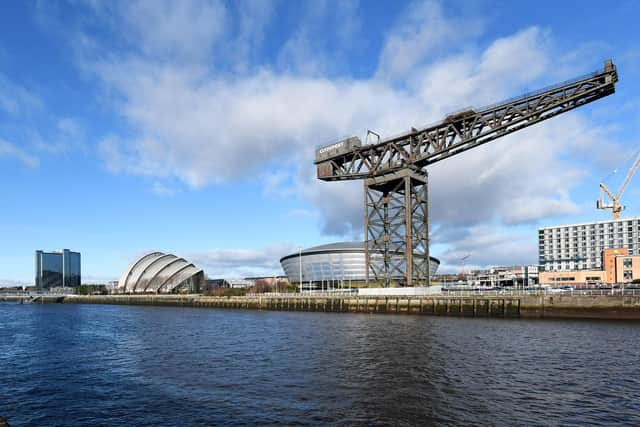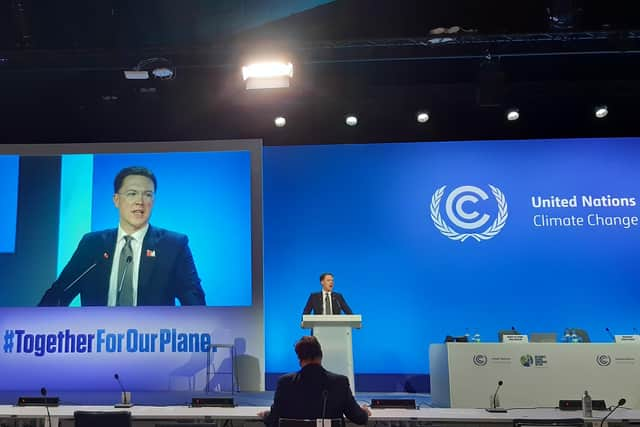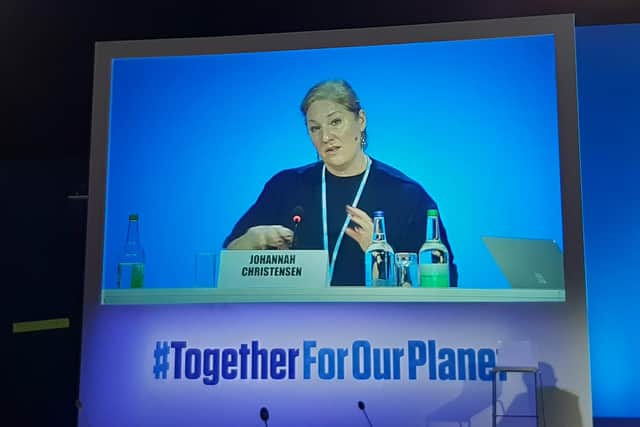COP26: ‘Clydebank Declaration’ launched to pioneer six zero-emission shipping routes
The agreement at the COP26 climate change conference in Glasgow will see an initial six “green corridors” created by 2025, with “many more” by 2030.
They could include between Asia and the United States, and between Saudi Arabia and both China and India.
Advertisement
Hide AdAdvertisement
Hide AdShips on the routes would use fuels which emit no or little carbon dioxide, such as ammonia and methanol, with a 5 per cent target by 2030.


However, only 19 countries have signed up to the pledge so far, including the UK and nine others in Europe, with major shipping nations such as China and Brazil missing.
The scale of the 2050 challenge is reflected in the fact that initially only around 200 ships are expected to run on the new green fuels within a decade compared to the global fleet of around 50,000.
Shipping carries 90 per cent of what we buy in the shops from other countries and other goods, and accounts for some 3 per cent of total global emissions – equivalent to the world’s sixth largest polluting state.
However, its emissions are forecast to increase by 50 per cent by 2050, in line with the expected growth in world trade, if no action is taken.


Pressure for cuts has come from firms such as Amazon, IKEA and Unilever, which have committed to using only zero-emission shipping by 2040.
Danish shipping company Maersk, one of the world’s largest with a fleet of 740, said it will only order vessels capable of running on green fuels, with its first methanol-powered ship due in 2023, while others could be retrofitted.
Morten Bo Christiansen, its head of decarbonisation, told the conference: “The sector needs to be in a very different place to where it is today.
Advertisement
Hide AdAdvertisement
Hide Ad"We are on the wrong trajectory – emissions are going up,” he said.


The declaration has been named to mark Glasgow hosting the United Nations’ Conference of the Parties summit, and the Clyde’s significant maritime history.
Hundreds of ships and thousands of seafarers are managed from the city and Clydebank in what is thought to be the biggest concentration in Europe and represents one quarter of the sector in the UK.
UK maritime minister Robert Courts said: “In Scottish myth and legend, the Clyde is known as the purifying one, cleansing the lands it passes through.
"How apt then, that we are setting off together on a voyage to decarbonise and to cleanse the overseas routes that connect us.”
Mr Courts said the declaration was “sending a key demand signal to industry”, which marked the “starting pistol to invest, research and develop these technologies with confidence”.
But he acknowledged that “leaps in innovation” were required to make green fuels viable.
Supplies are currently very limited and cost up to four times as much as oil.
Advertisement
Hide AdAdvertisement
Hide AdThe initial signatories to the declaration are Australia, Belgium, Canada, Chile, Costa Rica, Denmark, Fiji, Finland, France, Germany, Ireland, Japan, Marshall Islands, Netherlands, New Zealand, Norway, Sweden, UK and the United States.
A message from the Editor:
Thank you for reading this article. We're more reliant on your support than ever as the shift in consumer habits brought about by coronavirus impacts our advertisers.
If you haven't already, please consider supporting our trusted, fact-checked journalism by taking out a digital subscription.
Comments
Want to join the conversation? Please or to comment on this article.
